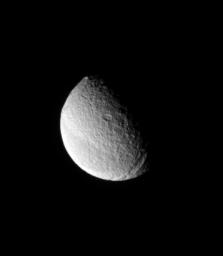
|
Fortunate View
- Click the image above for a larger view
- Full-Res JPEG (357 x 409) (5.8 kB)
- Full-Res TIFF (357 x 409) (146.4 kB)
Caption:
From a highly inclined orbit, the Cassini spacecraft looks toward far northern latitudes on Tethys.
Here, the spacecraft was above a position about 45 degrees north of the moon's equator. This vantage point afforded a view of the moon's three most recognizable features: the Ithaca Chasma canyon system (at lower right), Odysseus crater (at upper left) and the equatorial band of darker terrain (at lower left).
Lit terrain seen here is on the leading hemisphere of Tethys (1,062 kilometers, or 660 miles across). North is up.
The image was taken in visible light with the Cassini spacecraft narrow-angle camera on April 29, 2008. The view was obtained at a distance of approximately 991,000 kilometers (616,000 miles) from Tethys and at a Sun-Tethys-spacecraft, or phase, angle of 73 degrees. Image scale is 6 kilometers (4 miles) per pixel.
Background Info:
The Cassini-Huygens mission is a cooperative project of NASA, the European Space Agency and the Italian Space Agency. The Jet Propulsion Laboratory, a division of the California Institute of Technology in Pasadena, manages the mission for NASA's Science Mission Directorate, Washington, D.C. The Cassini orbiter and its two onboard cameras were designed, developed and assembled at JPL. The imaging operations center is based at the Space Science Institute in Boulder, Colo.
For more information about the Cassini-Huygens mission visit http://saturn.jpl.nasa.gov/ . The Cassini imaging team homepage is at http://ciclops.org .
Cataloging Keywords:
| Name | Value | Additional Values |
|---|---|---|
| Target | Tethys | |
| System | Saturn | |
| Target Type | Satellite | |
| Mission | Cassini-Huygens | |
| Instrument Host | Cassini Orbiter | |
| Host Type | Orbiter | |
| Instrument | Imaging Science Subsystem (ISS) | |
| Detector | Narrow Angle Camera | |
| Extra Keywords | Crater, Grayscale, Visual | |
| Acquisition Date | ||
| Release Date | 2008-06-03 | |
| Date in Caption | 2008-04-29 | |
| Image Credit | NASA/JPL/Space Science Institute | |
| Source | photojournal.jpl.nasa.gov/catalog/PIA09915 | |
| Identifier | PIA09915 | |
